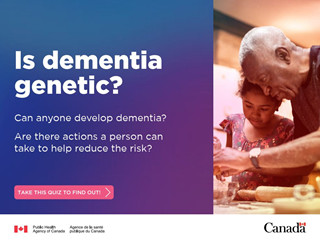Dementia: Risk factors and prevention
On this page
Risk factors
It is estimated that 14 potentially modifiable risk factors could explain 45% of cases of dementia globally.
Potentially modifiable dementia risk factors are ones you may be able to control.
Changes in the brain that may lead to dementia can begin decades before signs or symptoms appear. It is never too early or too late to take action that can benefit your brain health.
Not everyone develops dementia as they age. However, the likelihood of being diagnosed is almost six times higher in people aged 80 and over compared to those aged 65-79.
Social and economic aspects of an individual's life (social determinants of health) can also affect dementia risk. As a result, measures that can contribute to efficiently reducing dementia risk across the population include:
- healthy living environments
- equal access to quality education
- available, reasonably-priced, nutritious food
- safe working conditions
Some modifiable risk factors such as air pollution, smoking, and lower levels of education are more common among individuals with lower socio-economic status (e.g., lower income and education levels).
Additional guidance on reducing risk is available from the World Health Organization and the Indigenous Cognition & Aging Awareness Research Exchange.
| Age group | Risk factor | Increased chance of developing dementia compared to someone without this risk factor |
|---|---|---|
| Early life (under 45 years of age) | Lower levels of education | 60% |
| Midlife (45 to 65 years old) | Diabetes | 70% |
| Traumatic brain injury | 70% | |
| Hearing loss | 40% | |
| High LDL cholesterol | 30% | |
| Obesity | 30% | |
| Smoking | 30% | |
| Alcohol use (more than 210 mL of pure alcohol, per week) | 20% | |
| Depression | 20% | |
| Hypertension | 20% | |
| Physical inactivity | 20% | |
| Later life (over 65 years of age) | Social isolation | 60% |
| Untreated vision loss | 50% | |
| Air pollution | 10% |
Actions to reduce dementia risk
A healthy lifestyle can help lower the chance of developing dementia and delay the progression of symptoms. It can also help prevent other chronic conditions that are linked to dementia. It is important to test regularly for these conditions such as high blood pressure, diabetes, and high LDL cholesterol.
While genetics can influence dementia risk, research suggests that taking action can be even more effective for those with a potential genetic risk. Very few cases of dementia are directly linked to genetics.
Action to reduce risk can make a difference at any stage of life. Evidence suggests that it is likely to be most impactful at midlife (ages 45 to 65) for several risk factors. However, the timing, duration, and consistency of exposure to each risk factor may also influence the degree of risk. Table 1 shares the increased relative risk associated with each factor compared to someone without it.
Here are some ways to take action
- Attain higher educational outcomes, such as reading level and years of study
- Wear a helmet to reduce the risk of traumatic brain injury, for activities such as cycling or skiing
- Use ear protection when you may be exposed to harmful levels of noise (such as ear plugs or safety earmuffs), and wear hearing aids if you have hearing loss
- Aim to be at a healthy weight
- Quit smoking and avoid second-hand smoke (find local services here)
- Be as physically active as possible, such as going for regular walks, cycling, playing a team sport, working out at the gym and taking fitness classes
- Limit alcohol consumption
- Make visiting with family, friends, and other members of your community a priority to stay socially engaged
- Take steps to reduce your exposure to air pollution, including wildfire smoke
- Prevent and manage diabetes
- Prevent and manage high LDL cholesterol
- Seek treatment and learn coping skills for depression
- Prevent and manage high blood pressure
- Treat vision loss, such as from cataracts
Other healthy habits that may help to reduce risk:
- paying attention to the quality of your sleep
- eating a healthy, balanced diet
- cognitively challenging yourself by learning new things and engaging in new activities throughout life
